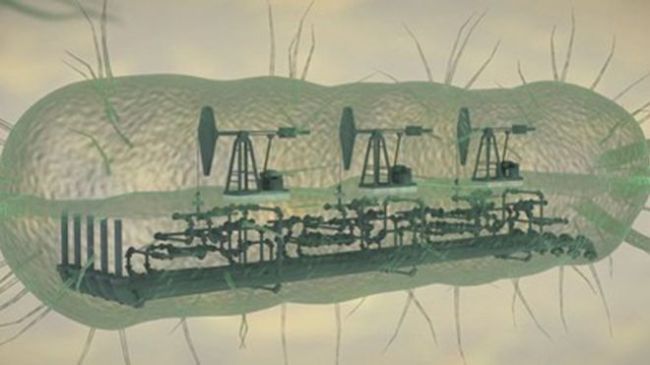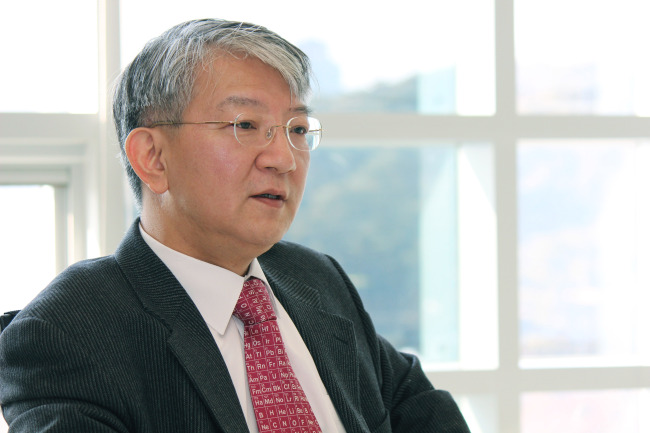Synthetic biology holds key to future
KAIST professor makes breakthrough in biorefining using E. coli’s metabolic process
By Yoon Min-sikPublished : March 14, 2014 - 20:48
A plume of smoke, a parade of workers in boiler suits and a giant complex is what comes to mind when most people think of a refinery.
But at a biorefinery, this image is replaced by white coats, petri dishes and clean labs, with tiny microbes doing the work of a refinery ― using replaceable biomasses to produce fuel, hard materials and other things useful for humans.
Lee Sang-yup, a distinguished professor of chemical and biomolecular engineering at KAIST, said that biorefining ― manipulating the metabolic process of microbes to produce materials like fuel ― has the potential to replace the fossil fuel-based industry one day.
“Plastic, fiber, fuel … all these materials come from crude oil. The problem is that oil is a limited resource that will some day run out,” Lee said. “Because of this, we grew interested in using renewable biomasses to produce substances.”
But at a biorefinery, this image is replaced by white coats, petri dishes and clean labs, with tiny microbes doing the work of a refinery ― using replaceable biomasses to produce fuel, hard materials and other things useful for humans.
Lee Sang-yup, a distinguished professor of chemical and biomolecular engineering at KAIST, said that biorefining ― manipulating the metabolic process of microbes to produce materials like fuel ― has the potential to replace the fossil fuel-based industry one day.
“Plastic, fiber, fuel … all these materials come from crude oil. The problem is that oil is a limited resource that will some day run out,” Lee said. “Because of this, we grew interested in using renewable biomasses to produce substances.”


Another issue, he said, was that fossil fuels create pollution. While there is debate about whether carbon dioxide is the direct cause of global warming, the use of petroleum produces fine-particle gases such as sulfur dioxide that cause various health issues for humans.
Since the existing industry relies on the rapid depletion of natural resources, scientists are turning to biorefining to find sustainable fuel sources.
Biorefining is exactly like it sounds: it uses living microbes to produce useful resources.
The problem with this process, however, is that these microorganisms were not designed by nature to do scientists’ bidding. The natural metabolic processes of the microbes are inefficient in terms of production costs.
This is where metabolic engineering comes in, enhancing the genes to push their efficiency to the limit. “By cutting off or amplifying the metabolic pathway, we make sure (the microbes) produce a lot of what we want,” Lee said.
He said his research team seeks to either be the best in a field already deemed important by most people, or to be the first to pioneer a brand new field.
One way that Lee’s team is enhancing the efficiency of existing technology is through its research on succinic acid, a material used in a wide range of materials including fiber, chemical products and even soft drinks.
By harnessing the bacterial fermentation of manipulated microbes, Lee’s team managed to achieve the highest level of succinic acid productivity ever reported, according to his report in the scientific journal Enzyme and Microbial Technology.
Lee added that his team at KAIST uses microbes to produce compounds like butanol that can be used for fuel. Butanol, a four-carbon alcohol, is structurally more similar to gasoline and more efficient as a biofuel than ethanol, the most common of the first-generation biofuels.
Not only does Lee’s team boast that the microbes have already achieved a higher level of production, but that the organisms create chemical substances that have been created only through petrochemistry.
Using engineered fatty-acid metabolism, a new synthetic pathway to biosynthesize short-chain alkanes, the team was able to induce Escherichia coli bacterium to produce gasoline for the first time.
“What we did was we created a metabolic pathway that does not exist in nature,” Lee said. “In our words, we challenged God.”
He says sometimes the production of these “non-natural chemicals” requires two steps. For example, scientists can create lactic acid with fermentation, which then goes through a series of complicated chemical processes to become macromolecules like polylactic acid.
Lee said their production level for gasoline is still fairly low. “Although I cannot predict when the technology will be commercialized, I can tell you one thing: We are persistently researching and seeing improvements,” he said.
If humans can defy nature and make artificial resources, the next logical step seems to be to use them.
“A few years ago, I said at the World Economic Forum that biorefining is essential. And that companies will have to start cutting down on their oil spending. Everyone scoffed,” he said. “Now everyone knows it is important.”
He said more uses of biotechnology to extract resources will be commercialized in the near future. In Korea, however, the process faces more challenges than in other places.
“The odd thing is that Korean companies were unable to commercialize home grown technologies like succinic acid, which is the best in the world,” he said, adding that businesses were reluctant to expand into biology due to a lack of expertise.
He said most local companies tend to see limited applications for biotechnology, such as for medicine.
“For whatever reason, the industrialization (of biotechnology) is too slow.”
Lee said the companies must take measures to adopt biotechnology because the paradigm shift to bio-based industries can occur unexpectedly.
“Not everything is going to change overnight but it is changing, one at a time. It is happening as we speak,” Lee said. “There is no telling what will become of the industry tomorrow. Like the boiling frog, the downfall will come abruptly.”
By Yoon Min-sik (minsikyoon@heraldcorp.com)







![[KH Explains] Hyundai's full hybrid edge to pay off amid slow transition to pure EVs](http://res.heraldm.com/phpwas/restmb_idxmake.php?idx=644&simg=/content/image/2024/04/18/20240418050645_0.jpg&u=20240419100350)







![[From the Scene] Monks, Buddhists hail return of remains of Buddhas](http://res.heraldm.com/phpwas/restmb_idxmake.php?idx=652&simg=/content/image/2024/04/19/20240419050617_0.jpg&u=20240419175937)

![[KH Explains] Hyundai's full hybrid edge to pay off amid slow transition to pure EVs](http://res.heraldm.com/phpwas/restmb_idxmake.php?idx=652&simg=/content/image/2024/04/18/20240418050645_0.jpg&u=20240419100350)

![[Today’s K-pop] Illit drops debut single remix](http://res.heraldm.com/phpwas/restmb_idxmake.php?idx=642&simg=/content/image/2024/04/19/20240419050612_0.jpg&u=)